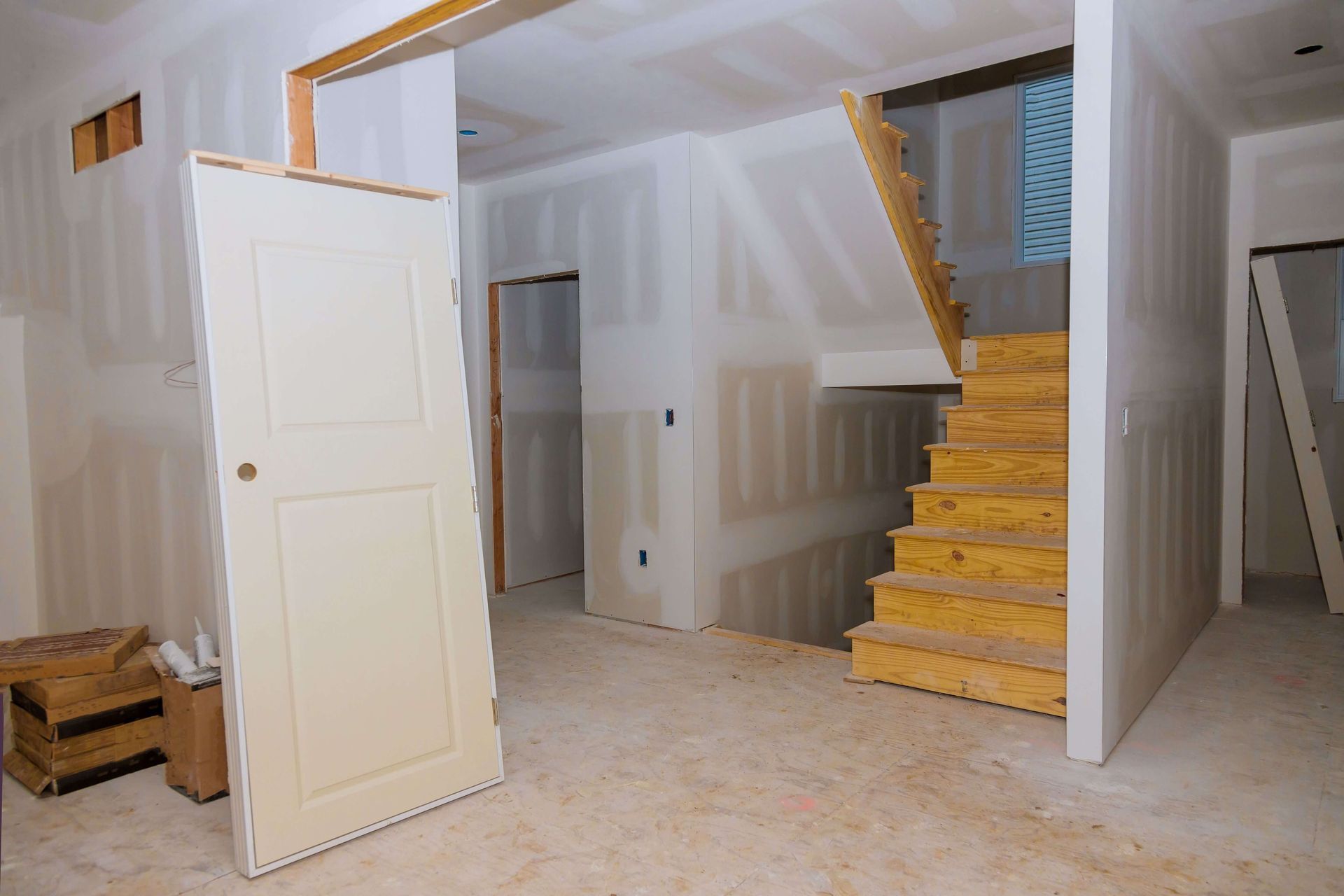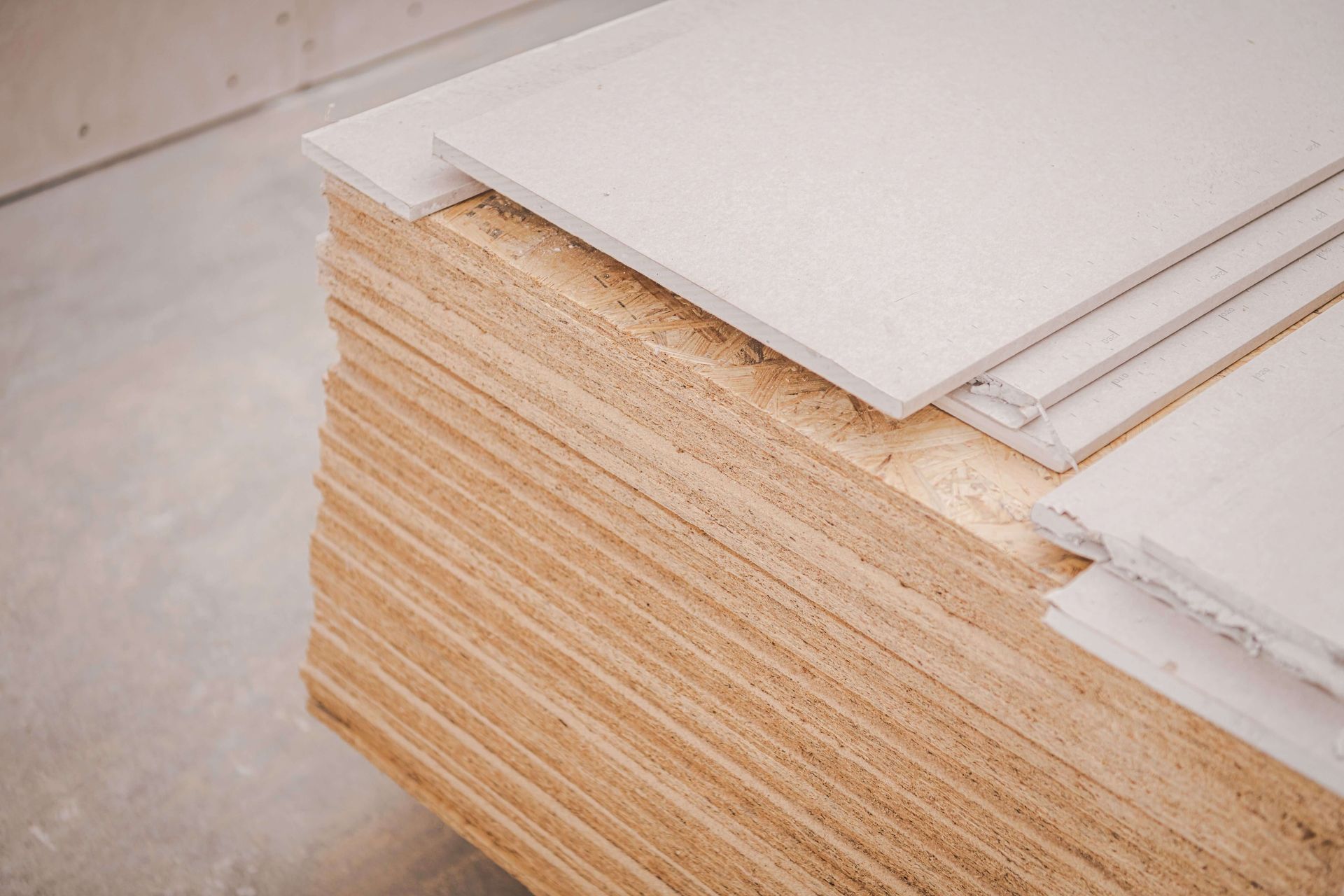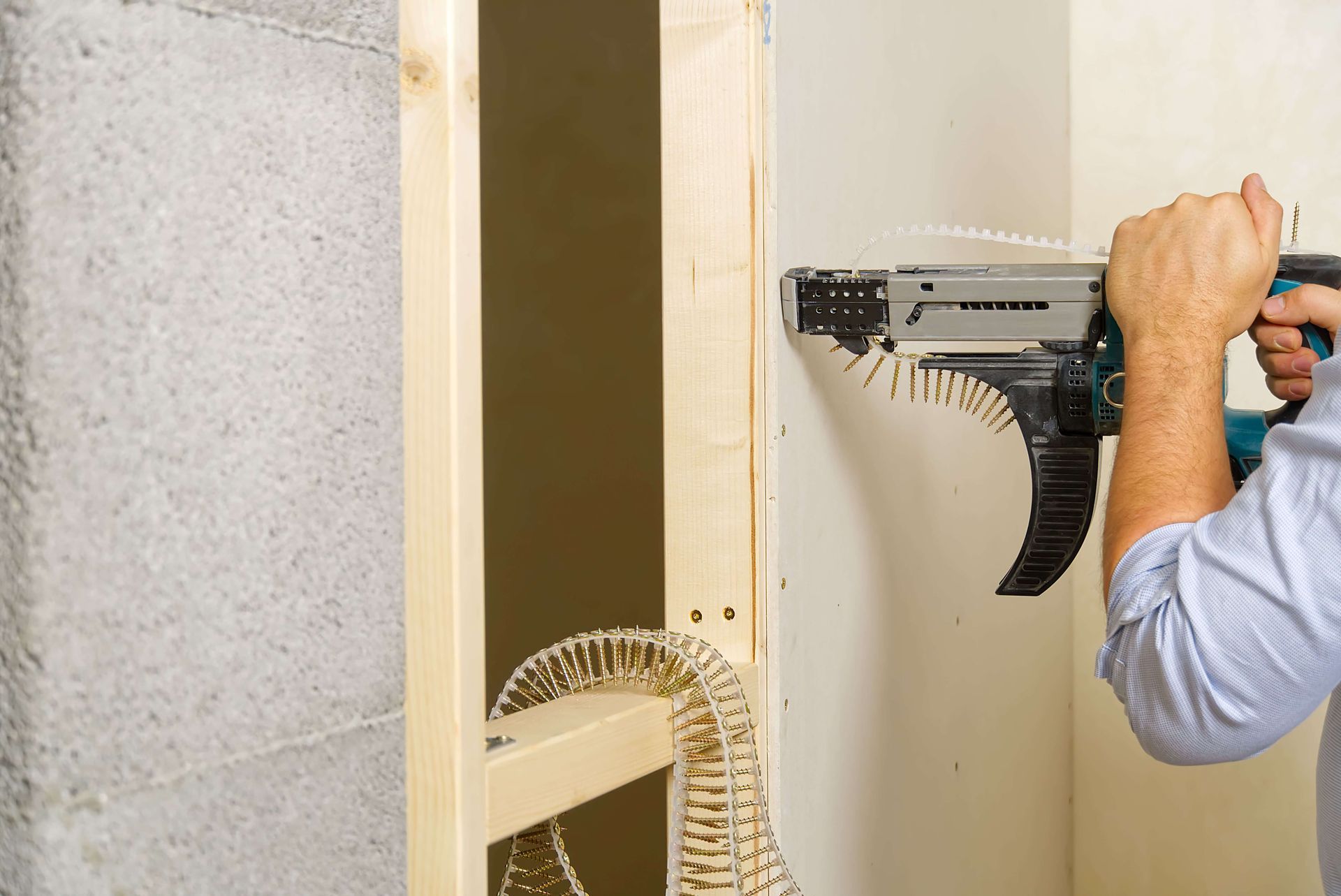Commercial vs. Residential Drywall: Key Differences and Considerations
Key differences between Commercial and Residential drywall

When it comes to wall construction, commercial and residential drywall are two of the most common options used. Drywall is a type of board made from gypsum that is used to create interior walls and ceilings in homes and other buildings. It is a relatively inexpensive material that is easy to work with and can be finished with a variety of textures, such as stippling, spackling, and texturing. The primary difference between commercial and residential drywall is the type of gypsum used in the board’s core. Commercial drywall typically uses a denser and stronger type of gypsum that is better suited for large, open spaces and high-traffic areas. Residential drywall, on the other hand, usually uses a less dense and weaker type of gypsum that is better suited for smaller spaces with lower weight loads.In addition to the type of gypsum used in the core, there are other key differences between commercial and residential drywall. Commercial drywall is typically thicker and stronger than residential drywall. It is also available in larger sizes and has higher fire ratings. Commercial drywall is also more expensive than residential drywall, so it may not be the best option for smaller residential projects. When it comes to installation and finishing, commercial drywall is usually installed by a professional team and finished with a variety of textures, such as stippling, spackling, and texturing. Residential drywall, on the other hand, can usually be installed by an experienced do-it-yourselfer and finished with a simpler texture, such as paint or wallpaper. Overall, commercial and residential drywall have their own unique advantages and drawbacks. When deciding which type of drywall is best for a specific project, it’s important to consider the size of the space, the weight load, the fire rating, the cost, and the installation and finishing requirements.
Definitions of Commercial and Residential Drywall
When it comes to drywall, there are a few key differences between commercial and residential applications. Commercial drywall is typically thicker and more durable than residential drywall, and is designed to withstand heavy traffic and more frequent use. Commercial drywall is also designed to be fire resistant and soundproof, making it ideal for larger buildings and structures. Residential drywall, on the other hand, is typically thinner and less durable than commercial drywall. It is designed to be used in homes and smaller buildings, and is not as fire resistant or soundproof as commercial drywall. Residential drywall is usually cheaper than commercial drywall, making it a popular choice for home renovation projects.In terms of materials, commercial drywall is typically made from a higher grade gypsum core and is reinforced with paper-backed fiberglass mesh. This makes it more durable and resistant to damage, which is important in commercial applications. Residential drywall is usually made from a lower grade gypsum core and is reinforced with paper-backed fiberglass mesh or cardboard.When it comes to installation, commercial drywall is typically installed by professionals, while residential drywall is usually installed by do-it-yourselfers. Commercial drywall requires more skill and experience to install properly, as it must be done to exact specifications and is subject to additional fire and soundproofing regulations. Residential drywall is easier to install, but still requires the same basic skills and attention to detail as commercial drywall.Finally, commercial drywall is often finished with a more durable, long-lasting paint or texture than residential drywall. Commercial drywall requires additional steps to seal it properly, such as using primer or sealer before painting or texturing. Residential drywall, on the other hand, is often finished with a less durable paint or texture that does not require additional steps for sealing.In short, commercial and residential drywall differ in terms of thickness, durability, materials used, installation requirements, and finishing techniques. Choosing the right type of drywall for your project is important, so be sure to weigh the key differences and considerations before making a decision.
Key Differences Between Commercial and Residential Drywall
When comparing commercial and residential drywall, there are several key differences to consider. The most obvious difference is the size of the board. Commercial drywall is typically used in larger spaces such as offices, stores, or restaurants, and is available in larger sizes than residential drywall. Commercial drywall is typically thicker than residential drywall, ranging from 0.5” to 1” in thickness, and is designed to provide additional structural strength.The type of drywall used in commercial spaces is also typically more durable than residential drywall. This is due to the fact that commercial drywall is designed to withstand wear and tear from heavy traffic and usage. Commercial drywall is also designed to be more fire resistant, as it is usually made with a non-combustible core.The finish of the drywall is also an important factor to consider when comparing commercial and residential drywall. Commercial drywall is usually finished with a texture that makes it easier to clean and maintain. Residential drywall is typically finished with a smooth finish, making it more aesthetically pleasing.In addition to the size, thickness, and finish of the drywall, there are other key differences between commercial and residential drywall. Commercial drywall is designed to be more soundproof, making it an ideal choice for businesses that want to reduce noise from outside sources. Commercial drywall is also designed to be more moisture-resistant, making it a better choice for areas that are prone to dampness or flooding.When considering commercial and residential drywall, it is important to understand the differences between the two and choose the type of drywall that best suits the project. Understanding the key differences between the two types can help ensure that the drywall is properly installed and that the project will be completed successfully.
Considerations for Commercial Projects
Commercial projects require a great deal of attention to detail when it comes to drywall selection and installation. Cost is a key factor when considering drywall for commercial projects, as this will impact the overall budget for the project. Material considerations should also be taken into account, as different materials will have different effects on the longevity of the drywall. Labor costs should also be considered, as more complex projects may require more time to complete. Installation and finish considerations are also important, as this will determine the look and feel of the project.Cost considerations are an important factor when selecting drywall for commercial projects. The cost of drywall will vary based on the size and complexity of the project, as well as the type of material used. Different materials have different price points, so it is important to research the cost of different materials in order to make an informed decision. Additionally, the labor required to install the drywall should be taken into account, as this will increase the cost of the project.Material considerations should also be taken into account when selecting drywall for commercial projects. Different materials have different properties, such as strength, durability, and fire resistance. These properties are important to consider when selecting drywall, as they determine the quality and longevity of the material. Additionally, different materials have different installation requirements, such as tools and adhesives, which should also be taken into account.Labor costs should also be taken into account when selecting drywall for commercial projects. The complexity of the project and the skill level of the workers will determine the amount of labor required to complete the project. Additionally, the size of the project will also factor into the labor costs, as larger projects will require more time to complete. Installation and finish considerations are also important when selecting drywall for commercial projects. Different materials and finishes will have different effects on the look and feel of the project. Additionally, the installation process should be taken into account, as drywall can be installed in different ways, such as with screws, nails, or adhesives. The type of finish should also be considered, as this will determine the final appearance of the project. Overall, when selecting drywall for commercial projects, it is important to consider the cost, material, labor, and installation and finish. Taking these factors into account will ensure that the project is completed successfully and within budget.
Cost Considerations
When it comes to the cost of commercial and residential drywall, there are several factors to consider. For commercial projects, the size and complexity of the job are the biggest factors in determining the overall cost. Large jobs with complicated designs will require more materials and labor, leading to a higher cost. The materials used for commercial projects are also more expensive than those used for residential projects. This includes thicker gauge drywall, as well as other specialty drywall materials like fire-rated and moisture-resistant drywall. Lastly, the labor costs for commercial projects tend to be higher due to the complexity of the job.On the other hand, residential projects tend to be smaller in size and simpler in design, leading to lower overall costs. In addition, the materials used for residential projects are generally less expensive than those used for commercial projects. This includes thinner gauge drywall, as well as other specialty drywall materials like soundproofing and mold-resistant drywall. Lastly, the labor costs for residential projects tend to be lower due to the simplicity of the job.
Material Considerations
When it comes to material considerations, commercial and residential drywall have some similarities and some differences. For commercial projects, the most common type of drywall used is a type of gypsum board called type X. Type X drywall is a much thicker and denser version of regular drywall, and is designed to provide increased fire resistance in commercial buildings. It is also usually more expensive than regular drywall. Other materials commonly used in commercial drywall projects include fiberglass insulation, soundproofing insulation, and metal framing. Residential projects are generally constructed with a standard type of drywall, which is typically 1/2-inch thick. This type of drywall is typically much less expensive than type X drywall, but does not provide as much fire resistance. For residential projects, other materials commonly used include fiberglass insulation, paper-backed drywall, and wood framing. When it comes to soundproofing, commercial projects often require a special type of insulation that is designed to reduce sound transmission. The most common type of soundproofing insulation used in commercial projects is made from mineral fiber. It is usually installed between two layers of drywall and helps to block sound from traveling between rooms. Residential projects typically do not require any special soundproofing insulation, although it can be used if desired. The most common type of soundproofing insulation used in residential projects is fiberglass insulation, which is usually installed between two layers of drywall and helps to block sound from traveling between rooms. In terms of installation and finish considerations, there are some differences between commercial and residential drywall projects. Commercial projects often require the use of specialized tools and techniques, such as using a drywall taping machine to tape and finish drywall seams. Residential projects usually require less specialized tools and techniques, and can often be completed using a traditional taping knife. In addition, commercial projects typically require the use of a specialized type of drywall compound, such as hot mud, which is designed to provide a stronger bond between the drywall and the framing. Residential projects usually require the use of a standard type of drywall compound, such as a standard setting-type compound, which is designed to provide a good bond between the drywall and the framing. In terms of painting, commercial projects typically require the use of a specialized type of paint, such as a water-based or oil-based paint, which is designed to provide a better bond between the paint and the drywall. Residential projects usually require the use of a standard type of paint, such as a latex or acrylic paint. Finally, commercial projects often require the use of specialized tools and techniques when it comes to finishing the drywall. This may involve using a drywall sander to smooth out the drywall surface before applying the paint, as well as using a special type of taping knife to tape and finish the drywall seams. Residential projects usually require less specialized tools and techniques, and can often be completed using a traditional taping knife. Overall, there are some key differences between commercial and residential drywall when it comes to material considerations. Commercial projects typically require the use of a thicker, denser type of drywall, as well as specialized materials such as soundproofing insulation and metal framing. Residential projects typically require the use of a standard type of drywall, as well as materials such as fiberglass insulation and wood framing. In addition, commercial projects typically require the use of specialized tools and techniques when it comes to installation and finishing, while residential projects usually require less specialized tools and techniques.
Labor Considerations
When it comes to labor considerations for commercial drywall projects, there are many factors to consider. First and foremost, you will need to hire enough skilled labor to get the job done. Depending on the size and complexity of the project, this could mean a few workers or an entire team of drywallers. Additionally, you will need to factor in the labor costs associated with each worker. This includes both the cost of wages and the cost of any supplies or tools they may need to complete the job. When selecting members for your drywall team, it is important to choose individuals with the necessary skills and experience. It is also important to be sure that each team member is properly trained and equipped for the job. This includes providing them with the right tools and safety equipment, as well as ensuring they are aware of any local regulations or requirements. When it comes to residential drywall projects, labor considerations are not usually as complex. For the most part, residential drywall jobs can be completed by a single skilled contractor. However, in some cases, additional help may be needed for larger projects. In these cases, it is important to choose a contractor who has experience and is familiar with the local regulations. Additionally, it is important to factor in any additional labor costs that may be associated with the project. No matter what type of drywall project you are working on, it is important to ensure that your labor force is up to the task. Properly trained and experienced workers are essential for any drywall project, and taking the time to carefully consider your labor force is key to completing the job on time and on budget.
Installation and Finish Considerations
When it comes to installing drywall for commercial and residential projects, there are several key differences to consider. The installation and finish of commercial drywall will differ from that of residential drywall, and it’s important to understand the differences to ensure the job is completed correctly and efficiently. When installing commercial drywall, it’s critical to ensure the walls are properly framed and connected to the floor and ceiling joists. In addition, the walls must be securely fastened with screws and/or nails and the drywall should be cut to fit around windows, doors and other obstructions. Commercial drywall requires a more precise installation, as it must be connected to a specific stud and framing system. It also requires additional support in areas that will be exposed to greater amounts of foot traffic or movement. When it comes to finishing commercial drywall, it is important to use a high-quality joint compound. This is because commercial drywall will typically need to be finished with level 5 or 6 drywall finish, which requires more sanding and finishing than residential drywall. The joint compound should also be applied to the edges of the drywall and sanded down to create a smooth finish. It is also important to make sure the edges of the drywall are properly sealed to prevent moisture from entering the wall. When it comes to residential drywall installation, it is important to make sure the walls are properly framed, fastened and cut to fit around windows and doors. Residential drywall can also be finished with a level 4 drywall finish, which requires less sanding and finishing than commercial drywall. The joint compound should be applied to the edges of the drywall and sanded to create a smooth finish. It is also important to make sure the edges of the drywall are properly sealed to prevent moisture from entering the wall. When it comes to finishing residential drywall, it is important to use a high-quality joint compound. This is because residential drywall will typically need to be finished with level 4 drywall finish, which requires less sanding and finishing than commercial drywall. The joint compound should also be applied to the edges of the drywall and sanded to create a smooth finish. It is also important to make sure the edges of the drywall are properly sealed to prevent moisture from entering the wall. It is also important to consider the type of paint that will be used to finish the drywall. For commercial projects, it is important to use a high-quality paint that is specifically designed for commercial use. This ensures the paint will be able to withstand the wear and tear of a commercial space. For residential projects, it is important to use a paint that is designed for residential use, as it will be more resistant to fading, chipping and other damage. Overall, it is important to understand the key differences between commercial and residential drywall installation and finish. By taking the time to consider the different types of drywall and the necessary installation and finishing techniques, you can ensure the job is completed correctly and efficiently.
Considerations for Residential Projects
For many residential projects, drywall installation is the preferred material for interior walls and ceilings. The drywall is usually cut to size and hung on the studs that form the frame of the wall. Once the drywall is hung, the joints are taped and finished off with a layer of joint compound. This process is usually followed by painting the walls and ceilings.The cost of materials for residential drywall projects is generally lower than that of commercial projects. Residential drywall is typically sold in smaller sheets, which are easier to maneuver and install. This makes it easier to purchase the exact amount of drywall needed for the project, which can help keep costs down. Additionally, residential drywall typically has fewer fire-resistant and sound-deadening properties than commercial drywall, so it’s not necessary to purchase as much of the material.When it comes to labor costs, residential drywall projects usually require fewer skilled workers than commercial ones. Residential projects usually involve only one or two workers, while commercial projects might require a larger crew. The smaller size of residential projects also means that the installation can often be completed in one day.The installation and finishing of residential drywall is often simpler than that of commercial projects. This is because residential projects usually involve fewer complicated cuts and angles, and the walls and ceilings are often smoother. This makes it easier to apply the joint compound and get a professional finish. When it comes to painting residential projects, there are fewer considerations than with commercial projects. Residential projects usually only require a single coat of paint, and this can be applied with a roller or a brush. For commercial projects, multiple coats of paint may be necessary for a professional finish, and spray painting may be necessary for the best results.In conclusion, there are significant differences between the materials, labor, and installation considerations for residential and commercial drywall projects. Residential projects are typically smaller and less complex, meaning they require fewer materials, fewer workers, and simpler installation and finishing processes.
Cost Considerations
Cost is often a major consideration in any construction project, and drywall is no exception. Although there are a few similarities between commercial and residential drywall when it comes to cost, there are also several key differences that contractors and consumers should be aware of. When it comes to commercial drywall, the cost of the materials is usually higher than residential drywall. This is because commercial drywall is typically produced with a higher grade of material, which is designed to withstand more wear and tear than residential drywall. Additionally, commercial drywall will often require additional components such as metal studs, fire-rated gypsum board, and vapor retarders to meet local building codes. These additional components will add to the overall cost of the project. On the other hand, residential drywall is usually less expensive than commercial drywall due to the lower grade of material used. However, residential drywall will still need to meet local building codes, so contractors should be aware of any additional components or materials that may be required to meet those codes. In addition to the cost of the materials, there are also labor costs associated with both commercial and residential drywall projects. Commercial drywall projects may require more labor than residential projects due to the complexity of the installation and the additional components that may need to be installed. Residential projects, on the other hand, may require less labor due to the fact that the installation is usually simpler and fewer components are required. Finally, it's important to consider the overall cost of the project when comparing commercial and residential drywall. The cost of the materials, labor, and any additional components should all be taken into account when determining the overall cost of the project. Additionally, contractors should also factor in the cost of any additional services that may be needed to complete the project, such as drywall finishing or painting. By considering all of the cost factors associated with commercial and residential drywall projects, contractors and consumers can ensure that they are getting the best value for their money. By understanding the differences between the two types of drywall and factoring in all the associated costs, contractors and consumers can make an informed decision about which type of drywall is best for their project.
Material Considerations
When it comes to the material considerations of commercial and residential drywall, there are many factors to consider. For commercial projects, the drywall must be able to withstand heavier wear and tear than residential drywall, and must be fire-resistant as well. As such, commercial drywall is typically thicker than residential drywall, and is often made from gypsum and other materials for enhanced sturdiness. It is also important to consider the type of surface finish that is required for the commercial project. Commercial drywall is often finished with a texture to make it more durable, whereas residential drywall is usually finished with a smooth coat.For residential projects, the primary material consideration is cost. Residential drywall is much less expensive than commercial drywall, making it the ideal choice for projects with tight budgets. Residential drywall is also less thick than commercial drywall, making it easier to install. In addition, residential drywall is usually finished with a smooth coat for a more aesthetically pleasing look. It is important to note, however, that residential drywall is not as durable as commercial drywall, so it is important to weigh the cost savings against the potential for damage.
Labor Considerations
When it comes to labor considerations for commercial and residential drywall projects, the amount of time and the number of workers can vary significantly depending on the scope of the project. For commercial projects, drywall installation typically requires a larger team of experienced professionals, as well as a project manager to coordinate the work. The project manager must ensure that the project is on track and that all the necessary materials and tools are available. When it comes to residential projects, the scope of the project will often determine the size of the team and the type of labor required. For smaller projects, such as patchwork or minor repairs, one or two experienced drywallers may be sufficient. However, for larger projects, such as renovations or new construction, a larger team of drywallers may be needed. The types of labor required for commercial and residential projects also vary. Commercial projects often require more specialized labor, such as metal stud framing, which can be time-consuming and require a high level of skill to complete correctly. Residential projects may require more basic framing and installation, but may also require more finishing work, such as taping and mudding. When selecting a team of workers for a commercial or residential drywall project, it is important to consider their experience and skill level. Experienced drywallers can often complete projects faster and with better results, making them a worthwhile investment. For commercial projects, the team should also be familiar with the specific building codes and regulations that apply to the project site. Overall, labor considerations for commercial and residential drywall projects can vary significantly depending on the scope of the project. It is important to select a team of workers with the necessary experience and skill level to ensure the project is completed correctly and on time.
Installation and Finish Considerations
When it comes to the installation and finish of commercial and residential drywall, there are several key differences to consider. For commercial projects, the installation and finish process can be more complex and time-consuming than for residential projects. This is because commercial projects often involve multiple levels of drywall in different areas and require intricate details to be followed. It is important to ensure that the drywall is properly installed and finished, as any mistakes can be costly.When it comes to the installation of commercial drywall, there are several steps to consider. First, the drywall should be hung using metal studs or track to ensure that the drywall is securely fastened to the wall. Once the drywall is hung, it should be taped off and sanded to create a smooth surface. Finally, the joints should be taped and the wall should be spackled and sanded to create a seamless finish.The finish of commercial drywall projects can be more complex than residential drywall projects. For commercial projects, it is important to choose the right type of paint and primer for the job. The paint should be durable and high-quality, as it will likely be exposed to heavy use. Additionally, a sealant should be applied to the drywall to protect it from moisture and other environmental factors.For residential projects, the installation and finish process is often simpler and less time-consuming. The drywall should be hung with metal studs or track and taped off and sanded. The wall should then be spackled and sanded to create a smooth surface. Lastly, the wall should be painted with a durable, high-quality paint that is suited for the environment.No matter the project, it is important to ensure that the drywall is installed and finished properly. If the installation and finish process is not done properly, it can lead to costly repairs and damage to the drywall. Additionally, proper installation and finish will ensure that the drywall lasts for many years to come.
Conclusion
When deciding between commercial and residential drywall, it’s important to weigh the pros and cons of each type. Commercial drywall is generally thought to be of a higher quality than residential drywall, and can also be customized to fit the unique needs of a commercial project. However, it also comes with a much higher price tag. Residential drywall, on the other hand, is more affordable and generally easier to install. However, it may not be as durable or customizable. Ultimately, the decision between commercial and residential drywall depends on the project at hand. It’s important to consider all of the factors including cost, material, labor, and installation and finish. By understanding the key differences and considerations between commercial and residential drywall, you can make an informed decision for your project that will best suit your needs.
Feel free to contact our
drywall contractors for more information on residential vs commercial drywall.
Contact us or fill out the form below for a FREE drywall estimate.
Get Instant Quote



